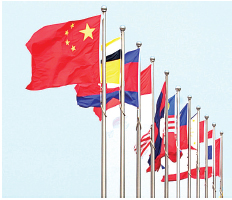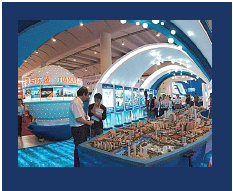
The establishment of China-ASEAN Free Trade Area (FTA), which is a significant event in Asia, will exert a deep influence on bilateral relations between China and the Association of Southeast Asian Nations (ASEAN), a renowned Singapore scholar has said. In a recent exclusive interview with Xinhua, Tan Khee Giap, Chair of the Singapore National Committee for Pacific Economic Cooperation, said that China has made great contributions to the establishment of the FTA, which is to set sail on Jan. 1, 2010, and is mutually beneficial to China and the regional bloc. Tan noted that the FTA, which was initially proposed by China, shows that China is willing to grow together and share with its neighbors the economic achievements the largest developing country has scored over the past three decades. "This has put tremendous momentum to the establishment of the FTA," Tan said, adding that "It took a relatively short period of time to reach the free trade agreement, which is a good thing for both sides and a significant event in Asia." The China-ASEAN FTA will create an economic region with 1.9 billion consumers, a regional Gross Domestic Product (GDP) of about 6 trillion U.S. dollars and total trade estimated at 4.5 trillion U.S. dollars. This makes it the biggest FTA in the world in terms of population size. Tan said the FTA will bring both political and economic benefits to ASEAN, which has further enhanced its strategic position after the completion of the China-ASEAN FTA. The China-ASEAN FTA is pioneering, he said, adding that after the China-ASEAN FTA, countries such as Japan, India and South Korea all want to follow suit. In terms of economic profits, he said that ASEAN countries have enjoyed a surplus in its trade with China in recent years. "ASEAN will certainly get more benefits in the future when it is more involved in the China market," Tan said. In his opinion, ASEAN countries at various development levels could each make use of their respective advantages under the FTA.

The less developed countries can export to China their agriculture goods while countries with abundant resources could sell oil, minerals and rubber to China, he said, adding that they can also buy more cheap manufacturing products from China. "So people from both ASEAN and China can have more choices and better prices on products," Tan said. Tan believes that the China-ASEAN FTA will have positive effects for the development of Asia. "Over the next 10 years, as China continues to open its market more widely, the total trade volume between Asian nations will grow and the dependence on export to western countries will decrease, which is helpful to the economic stability in Asia, " Tan said. Tan said that as Asian countries become less dependent on the western market and gradually increase their domestic consumption, their economy could be more resilient in the future to another financial crisis should it be triggered by the mismanagement of western finance industry. Tan regards the establishment of China-ASEAN FTA as only a new beginning, saying that two things must be done for the development of the FTA. First, all countries must fully cooperate with each other and abide by the agreements under the FTA to realize free trade in the area. Second, all countries should further open their domestic markets and promote free trade policies, and improve trade and investment environments. On reducing non-tariff trade barriers, Tan stressed the importance of regular negotiation, supervision and discussion among all nations under the FTA. "Non-tariff trade barriers will indirectly harm international trade, and all governments need to prevent policies which are contradictory to free trade," Tan said. On the prospects of the FTA, Tan said that in the mid-term future, 10 years from now, bilateral trade bet
Vans Old Skool Grise The establishment of China-ASEAN Free Trade Area (FTA), which is a significant event in Asia, will exert a deep influence on bilateral relations between China and the Association of Southeast Asian Nations (ASEAN), a renowned Singapore scholar has said. In a recent exclusive interview with Xinhua, Tan Khee Giap, Chair of the Singapore National Committee for Pacific Economic Cooperation, said that China has made great contributions to the establishment of the FTA, which is to set sail on Jan. 1, 2010, and is mutually beneficial to China and the regional bloc. Tan noted that the FTA, which was initially proposed by China, shows that China is willing to grow together and share with its neighbors the economic achievements the largest developing country has scored over the past three decades. "This has put tremendous momentum to the establishment of the FTA," Tan said, adding that "It took a relatively short period of time to reach the free trade agreement, which is a good thing for both sides and a significant event in Asia." The China-ASEAN FTA will create an economic region with 1.9 billion consumers, a regional Gross Domestic Product (GDP) of about 6 trillion U.S. dollars and total trade estimated at 4.5 trillion U.S. dollars. This makes it the biggest FTA in the world in terms of population size. Tan said the FTA will bring both political and economic benefits to ASEAN, which has further enhanced its strategic position after the completion of the China-ASEAN FTA. The China-ASEAN FTA is pioneering, he said, adding that after the China-ASEAN FTA, countries such as Japan, India and South Korea all want to follow suit. In terms of economic profits, he said that ASEAN countries have enjoyed a surplus in its trade with China in recent years. "ASEAN will certainly get more benefits in the future when it is more involved in the China market," Tan said. In his opinion, ASEAN countries at various development levels could each make use of their respective advantages under the FTA.
The establishment of China-ASEAN Free Trade Area (FTA), which is a significant event in Asia, will exert a deep influence on bilateral relations between China and the Association of Southeast Asian Nations (ASEAN), a renowned Singapore scholar has said. In a recent exclusive interview with Xinhua, Tan Khee Giap, Chair of the Singapore National Committee for Pacific Economic Cooperation, said that China has made great contributions to the establishment of the FTA, which is to set sail on Jan. 1, 2010, and is mutually beneficial to China and the regional bloc. Tan noted that the FTA, which was initially proposed by China, shows that China is willing to grow together and share with its neighbors the economic achievements the largest developing country has scored over the past three decades. "This has put tremendous momentum to the establishment of the FTA," Tan said, adding that "It took a relatively short period of time to reach the free trade agreement, which is a good thing for both sides and a significant event in Asia." The China-ASEAN FTA will create an economic region with 1.9 billion consumers, a regional Gross Domestic Product (GDP) of about 6 trillion U.S. dollars and total trade estimated at 4.5 trillion U.S. dollars. This makes it the biggest FTA in the world in terms of population size. Tan said the FTA will bring both political and economic benefits to ASEAN, which has further enhanced its strategic position after the completion of the China-ASEAN FTA. The China-ASEAN FTA is pioneering, he said, adding that after the China-ASEAN FTA, countries such as Japan, India and South Korea all want to follow suit. In terms of economic profits, he said that ASEAN countries have enjoyed a surplus in its trade with China in recent years. "ASEAN will certainly get more benefits in the future when it is more involved in the China market," Tan said. In his opinion, ASEAN countries at various development levels could each make use of their respective advantages under the FTA.  The less developed countries can export to China their agriculture goods while countries with abundant resources could sell oil, minerals and rubber to China, he said, adding that they can also buy more cheap manufacturing products from China. "So people from both ASEAN and China can have more choices and better prices on products," Tan said. Tan believes that the China-ASEAN FTA will have positive effects for the development of Asia. "Over the next 10 years, as China continues to open its market more widely, the total trade volume between Asian nations will grow and the dependence on export to western countries will decrease, which is helpful to the economic stability in Asia, " Tan said. Tan said that as Asian countries become less dependent on the western market and gradually increase their domestic consumption, their economy could be more resilient in the future to another financial crisis should it be triggered by the mismanagement of western finance industry. Tan regards the establishment of China-ASEAN FTA as only a new beginning, saying that two things must be done for the development of the FTA. First, all countries must fully cooperate with each other and abide by the agreements under the FTA to realize free trade in the area. Second, all countries should further open their domestic markets and promote free trade policies, and improve trade and investment environments. On reducing non-tariff trade barriers, Tan stressed the importance of regular negotiation, supervision and discussion among all nations under the FTA. "Non-tariff trade barriers will indirectly harm international trade, and all governments need to prevent policies which are contradictory to free trade," Tan said. On the prospects of the FTA, Tan said that in the mid-term future, 10 years from now, bilateral trade betVans Old Skool Grise
The less developed countries can export to China their agriculture goods while countries with abundant resources could sell oil, minerals and rubber to China, he said, adding that they can also buy more cheap manufacturing products from China. "So people from both ASEAN and China can have more choices and better prices on products," Tan said. Tan believes that the China-ASEAN FTA will have positive effects for the development of Asia. "Over the next 10 years, as China continues to open its market more widely, the total trade volume between Asian nations will grow and the dependence on export to western countries will decrease, which is helpful to the economic stability in Asia, " Tan said. Tan said that as Asian countries become less dependent on the western market and gradually increase their domestic consumption, their economy could be more resilient in the future to another financial crisis should it be triggered by the mismanagement of western finance industry. Tan regards the establishment of China-ASEAN FTA as only a new beginning, saying that two things must be done for the development of the FTA. First, all countries must fully cooperate with each other and abide by the agreements under the FTA to realize free trade in the area. Second, all countries should further open their domestic markets and promote free trade policies, and improve trade and investment environments. On reducing non-tariff trade barriers, Tan stressed the importance of regular negotiation, supervision and discussion among all nations under the FTA. "Non-tariff trade barriers will indirectly harm international trade, and all governments need to prevent policies which are contradictory to free trade," Tan said. On the prospects of the FTA, Tan said that in the mid-term future, 10 years from now, bilateral trade betVans Old Skool Grise
 iConnectHub
iConnectHub
 Login/Register
Login/Register Supplier Login
Supplier Login



























